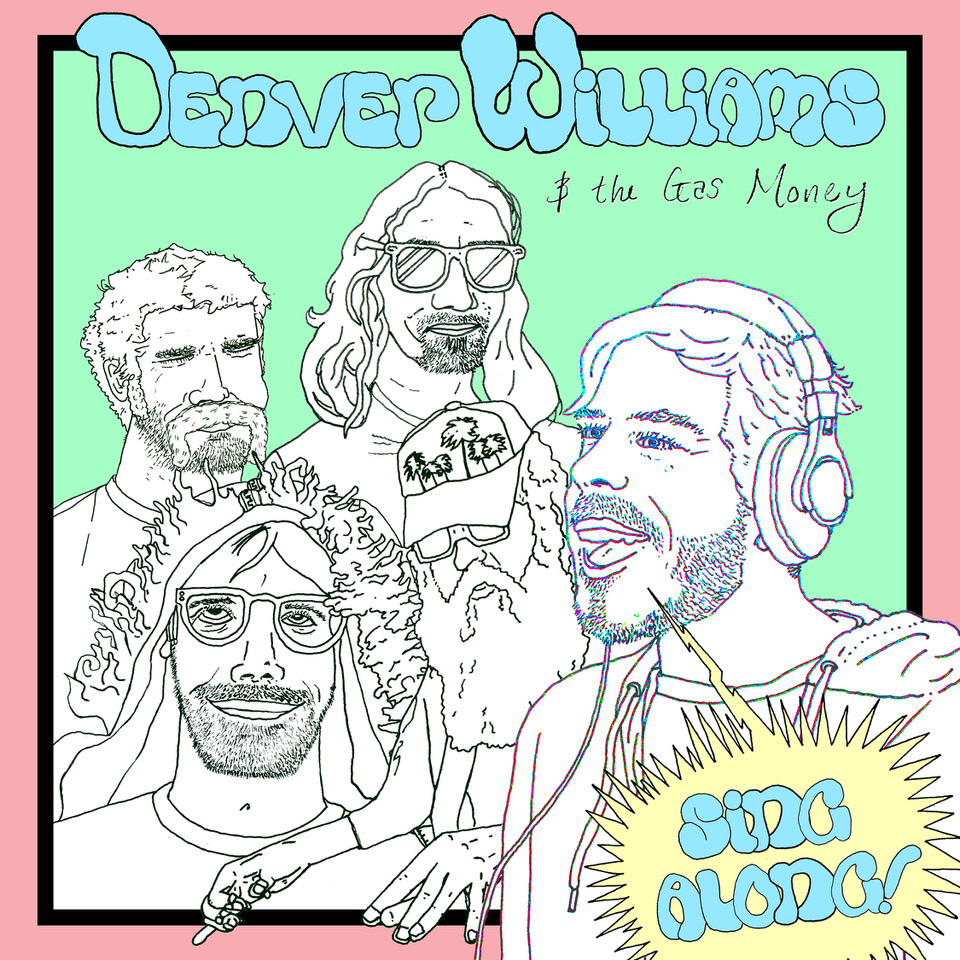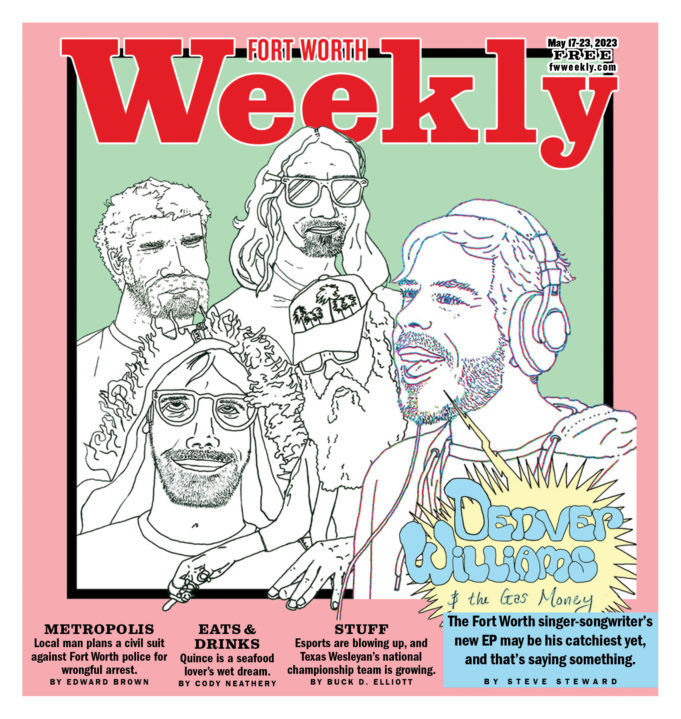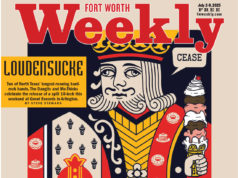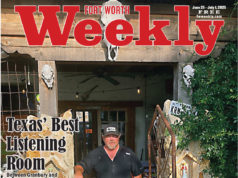The Sunday afternoon storm clouds spread across the sky like shreds of steel wool, rusted and bursting with their own rain and the setting sun. All the patio furniture in the gravel area in front of the Woodshed’s stage was wet, yet a pair of millennial couples had dried off some chairs at the edge of this zone, and when Denver Williams took the stage after he finished talking to me, these four people were pretty enthused by what they heard. I couldn’t tell if they were already fans or just happened to be out for Sunday beers, but they and a handful of other patrons sitting around the TCU-area barbecue restaurant seemed to be caught by his hooky melodies and the syncopated verbosity of his lyrics, which skipped along to his breezy, acoustic guitar boogie like flying fish wave-jumping around a boat. Farther from him but nearer to me, four college gals gossiped and passed around a miniature schnauzer, all of them mostly oblivious to the guy with the guitar. Yet one of them nodded along with a song, tapping her boot heel in time. I thought that was a win, especially since the song Williams was playing was the first track from the EP he released a couple of days prior, proof that a good song can get to people even when they don’t even know it.
Williams’ songs are nothing if not infectious, and whether you’re paying attention or not, they can get into your brain. It’s no wonder, given that Williams has been making the songwriter rounds for well over a decade, first in Austin, then here in Fort Worth, and over all that time, he’s developed a sound that leans outside a host of songwriter-y conventions. I don’t want to make him out to be “Fort Worth’s next big thing,” because he’s been here for years, but he is certainly a talent who is not as appreciated as he should be. Hopefully, all that constant gigging has helped his visibility a little — at least enough to perpetuate more paying gigs.
He was on a break between sets at the Woodshed when I talked to him about the current state of his musical endeavors.
“Well,” he said, chuckling as he looked at the people dining beneath the restaurant’s covered, open-air seating. “I turned it into a job.”
We talked about the challenges intrinsic to making a living as a songwriter, but for him, playing at a restaurant still beats working at one.
“Three or four years ago, I quit everything else,” he said. “I was working at Outback Steakhouse, and that was the last [day-job] thing I did.”
When it comes to booking shows, he said he’s “open to whatever — I like having the opportunity to play and make money, but I do want to be able to narrow [my performances] down, for the gigs to be what I want them to be. I’m thankful to be doing it, though.”
A paying gig is a paying gig, after all, and Williams plays like he’s thankful, too. There might have been a dozen people listening to him that day at Woodshed, but he played as if he were entertaining a hundred times as many. Perhaps the songs on his new release will open those doors for him to reach bigger crowds. They’re certainly good enough, and they’re easily the most accessible, ear candy-ish tracks in his catalog.
Sing Along collects five songs that he and a cadre of area musicians (Dylan Ewen on synths, Gary Grammer on harmonica, Samantha Knight on vocals, Burton Lee on pedal steel, BK Lovell on bass, Zach Mayo on guitar, and Peter Wierenga on drums) recorded at the Cove Studios in Arlington between December 2021 and January 2022, with Wierenga (Siberian Traps, Sur Duda) engineering. In all, they finished 17 songs. By the time the tracks were mixed and mastered (by Wierenga and Adam Thein, respectively), Williams realized he had two separate song collections on his hands. A dozen worked together as a currently untitled country album he hopes to release at the end of the year, but then there were the other five, which seemed to fit together as a unit on their own.

These became Sing Along. Fans got a preview of the new EP’s sound in February when Williams released the lead track, a snappy-tempo’d, Lemonheads-ish blast of sunny power pop called “Key Lime Pie.” A similarly bouncy single, “Radio Is On,” followed in March. Both songs shine with breezy, major keys and sparkly guitar tones that are more or less the binding agent between all of the five songs, but with its third track, the EP downshifts into a loping, 6/8 walk about beating addiction called “Kick This Heavenly Feeling.” It’s a pleasant ditty with a balmy chorus, with a subject matter that makes you feel like you’re looking up at a gorgeous summer sky while lying amid the weeds and needles of a vacant lot. When the song swells into a solo section that seems to drift into the clouds, you’re reminded of how Williams is an incredibly versatile songwriter, one who dabbles in a wide variety of stylistic hallmarks — Pavement-y guitar crunch with one project (his old band Chillamundo) and low-fi folk with another (his 2021 album Blooming Eye) — as well as being a laterally thinking guitarist, whose leads often poke out of the scale in purposeful, jazzy directions.
As a songwriter, Williams likes to try new things. Blooming Eye, he said, was “an effort to blend electronic [sounds] and organic instruments and doing it all at home, and [Sing Along] was kind of a return to Chillamundo and [another former band] Chingalotus … not really trying to recreate them but just rocking again, because when the pandemic hit and Chillamundo disbanded, we made a record in a bedroom. We softened the sound up, but this EP brings back the rock a little bit. I have this backlog of all sorts of songs, but when we recorded with [Wierenga], there were enough country-type songs to put that [album] together, too.”
Williams credits his willingness to travel across a map of variegated approaches to musical composition to a friend and former bandmate, multi-instrumentalist Charles Marchbanks (Chingalotus, Chillamundo, Henry the Archer).
“Me and Charles Marchbanks, we were playing together from the time we were 18 until, like, 28,” Williams said. “When I met him, I had one box of the pentatonic scale down, and I refused to learn anything else, and he’s one of the best songwriters I’ve ever heard. … He opened me up to music theory, like if I’m ever using a diminished chord moved up, that’s something he taught me. We used to talk a lot about Buddhism and free associative lyrics. There is so much of what I do as a songwriter that I credit to him. Our relationship gave me a springboard into music theory.”
That might sound esoteric to non-musicians, but when you hear a chord in one of Williams’ songs that hits your heart in the best way, this is what he’s talking about, what Marchbanks and playing guitar for years and years have taught him. And while every diminished chord in the book might not be enough to unlock that fabled level of professional-musician financial stability, Williams knows where they sound really great, and that’s but one reason his music transcends the Sunday day-drinking crowd, even while it sneaks into their ears.
Denver Williams & The Gas Money Record Release Party
8pm Fri w/Clint Niosi, The Kubes at The Cicada, 1002 S Main St, FW.












